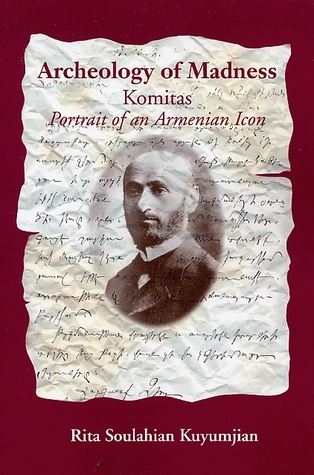Azad brought along a CD of Armenian choral music which included at least one recording of Komitas, himself. He is known to have had an extremely good singing voice.
Azad mistakenly read a different book about Komitas, also written by a psychologist. This doctor was of the opinion that Komitas was not mentally ill, he was just very angry about what had been done to him.
This is in opposition to the generally accepted view that Komitas was suffering from, among other things, Post-Traumatic-Stress-Disorder as a result of his arrest on April 24, 1915, and subsequent confinement and torture. He was released, but many of the others who were arrested were killed, including many of his friends.
While he was under arrest, his possessions were sold to pay for the rent of his apartment and he was kicked out of the apartment.
Earlier in his life he spent many years traveling through the Armenian countryside learning as much Armenian folk music as he could and recording it in his own, unique notation. He then wrote new music based on the old folk music. The religious leaders of Etchmiadzin were against the type of music that he was creating because it didn't follow the established rules which they used and it was much to earthy and lively. Komitas, in turn, thought that the singing in Etchmiadzin was of very poor quality and that the folk singing in the countryside was much better.
Most of the liturgy of the Armenian church which is now in use was written by Komitas.
Francis thought that the book was excellent, except for chapter 9, "The Lost Years", which he thought was too long and boring.
Peter picked up on the scene in the book when Komitas was first confined to the hospital/mental institute in Istanbul. He was assigned 3 doctors, an Armenian, a Greek and a Turk. The Turk, of course, was in charge. The Turkish doctor insisted that Komitas would only get better if he was prevented from speaking Armenian or hearing anyone speak Armenian. The Armenian doctor, of course, spoke to him in Armenian.
We all agreed that it was a worthwhile book to read.
Books for the future that we talked about include:
- "Burning Orchards" by Gurgen Mahari, which is set in Van in the time leading up to the genocide of 1915. This book was originally banned in Russian Armenia.
- "The Gambler" by William C. Rempel, which is a book about the life of Kirk Kerkorian.
There will be no book club meeting in December. We decided that the season is just too busy. The next meeting will be on January 17, 2019. To give us something a little bit lighter for the season, the book will be "Not a Creature Was Stirring" by Jane Haddam, which is a crime novel about a former FBI agent named Gregor Demarkian. It takes place during the Christmas season and is packed full of references to Armenian culture. It's readily available from Amazon or Barnes and Noble and I believe is stocked in the local libraries, too.
Happy reading and I hope to see you at the January meeting.
Leroy
